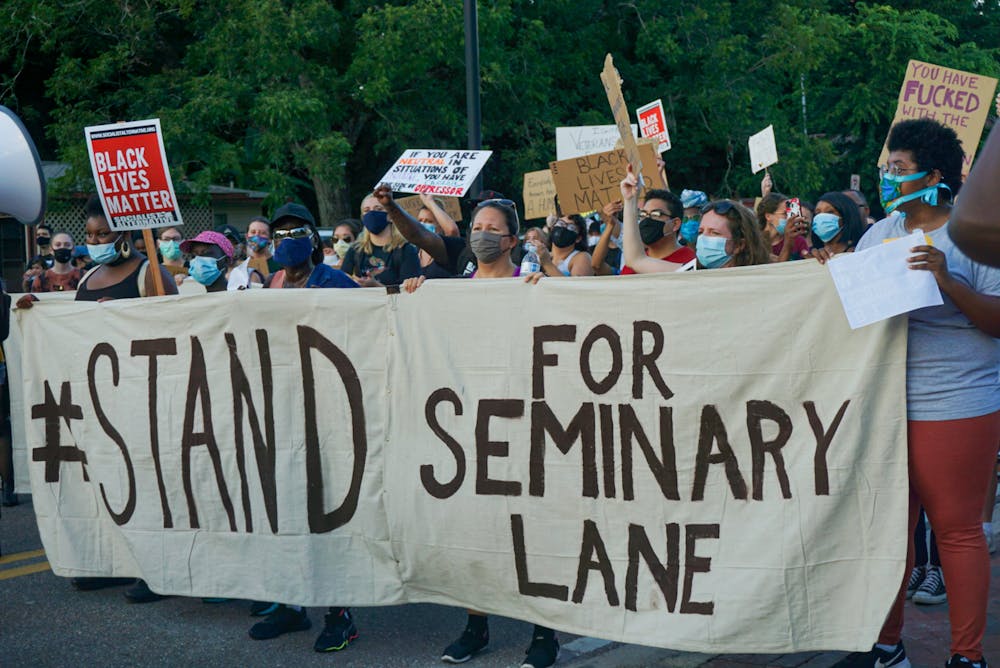Gainesville may temporarily halt the development of student luxury housing on its east side.
The Gainesville City Commission voted during a seven-hour meeting Monday to direct city staff to draft an ordinance that enacts a moratorium, or a temporary stop, of major residential and non-residential development. The morat in areas like Pleasant Street, Porters, and Duval in East Gainesville.
If approved, the moratorium would block most development in the area except affordable housing, retail stores less than 2,000 square feet, and buildings related to basic needs, such as health care, food and nutrition. The length of the potential moratorium was not decided in the vote.
The boundaries of the moratorium will encompass Fifth Avenue, Pleasant Street, Springhill, Duckpond, Duval, Sugarhill, Porters, North Lincoln Heights, Oakview and Northeast Neighbors. Downtown Gainesville will be excluded.
Most callers showed support for the moratorium during the meeting's public comment period. One caller said she hopes the city uses the moratorium to draft policy that will help communities become more aware of development projects before building starts.
“Nobody knows about these hotels or projects until ground is broken and it is unacceptable,” she said.
The vote stems from community concerns about the gentrification of Pleasant Street Historic District and Porters Quarters, two of Gainesville’s historically Black communities located on the east side, by the development of luxury student apartments.
Locals recently protested development plans for where Seminary Lane, an affordable housing complex located in Pleasant Street, stood until it was demolished in 2009. Former residents of Seminary Lane were promised that it would be rebuilt as affordable housing, but the land was recently purchased by an Orlando-based student housing developer.
City Commissioner Gail Johnson, who drafted Monday's resolution, said Seminary Lane was an example of how gentrification has impacted Gainesville. The moratorium won’t stop the development on Seminary Lane because it's development plans were already submitted for city code approval.
“What we are really good at right now is erasing neighborhoods, cultures, stories,” Johnson said. “That's what we are really good at in the United States.”
City Commissioners Gigi Simmons, Harvey Ward and Adrian Hayes-Santos, voted against the drafting of the moratorium ordinance. Simmons said she was concerned that the pause would prevent residents from selling their property.
The moratorium must come with policy changes that will support affordable housing development and protect communities, said Zeriah Folston, Gainesville’s policy oversight administrator. The pause alone will not work.
“A development moratorium is a tool, not a solution,” he said.
A moratorium without policy may raise rent prices because of limited housing options, Folston said.
The commission also voted to have staff research what building codes and zoning ordinances can be changed to promote affordable housing development.
As part of the vote, commissioners are required to walk the neighborhoods that would be impacted by the pause to understand how zoning changes could protect those neighborhoods.
Before the commissioners voted, they received an update on housing development in the city from Andrew Persons, a Gainesville urban planner.
Since 2016, 42 apartment-style projects have been built in the city. The buildings averaged 111 rooms with about 2.5 beds per room, Persons said. None of the projects were for affordable housing. Most of the developments targeted students — not the people who used to live in the area they were built on, he said
Other college towns have used a moratorium to slow development of student housing before, said Morgan Spicer, a research fellow for the city.
Chapel Hill, North Carolina, which is also the home of a large public university, had a development pause for six months that started in 2010. Its moratorium passed to slow student housing development in historically Black neighborhoods, Spicer said, and resulted in the first rise in Black home ownership in the city since the 1980s.
Johnson said she hopes the city's decision helps stop the type of gentrification she has seen occur in other cities, where wealthy, mostly white residents displaced people who lived there for decades.
“It happened, so in these neighborhoods, the Black and the brown people, they are gone,” she said. “They took them piece by piece, it felt like family by family.”
Protesters hold a banner that reads, "#StandForSeminaryLane," demanding that developers refrain from building luxury student apartments on land located in a historically Black community.






